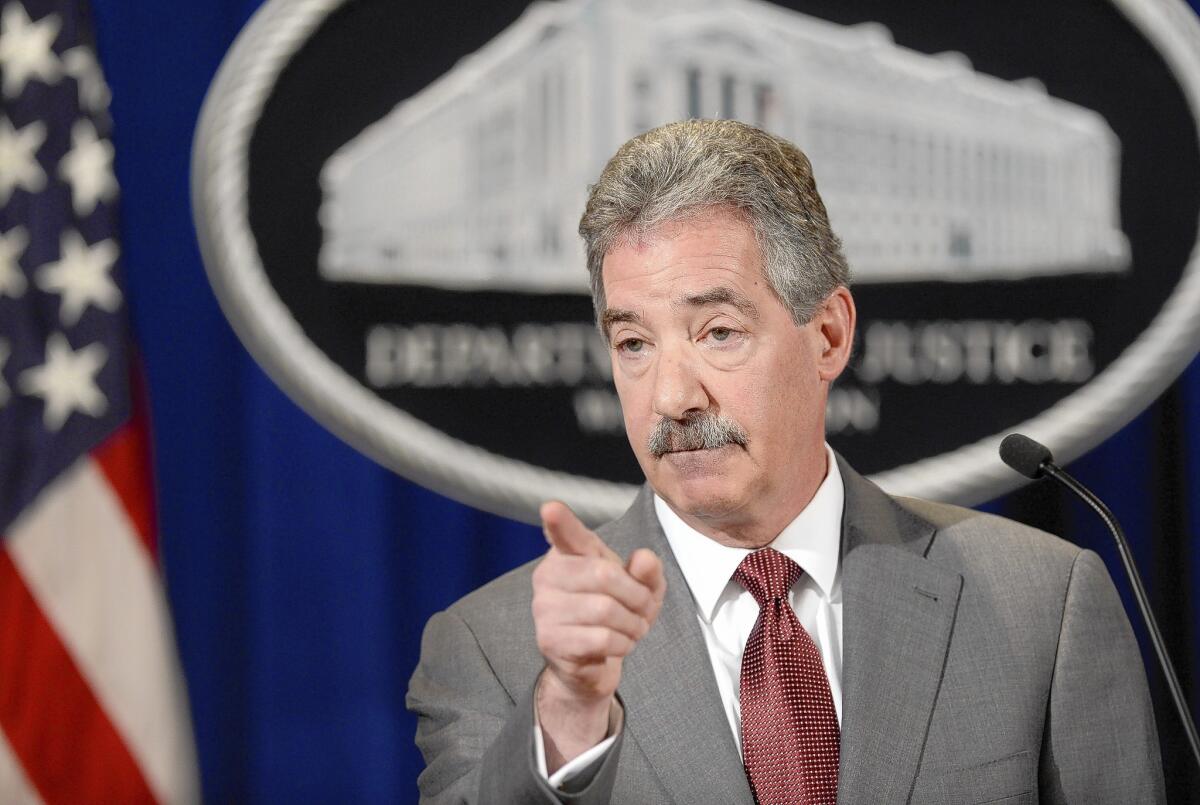Justice Department invites thousands of inmates to seek clemency

- Share via
WASHINGTON — The Justice Department on Wednesday unveiled the most ambitious federal clemency program in 40 years, inviting thousands of jailed drug offenders and other convicts to seek early release as part of a new program intended to correct sentencing injustices and relieve prison overcrowding.
Though eligibility restrictions may limit how many prisoners are ultimately released to several hundred, experts said they had not seen such a sweeping use of presidential clemency power to achieve a policy goal since President Ford’s amnesty for Vietnam draft dodgers in the 1970s.
The program is part of a campaign being waged by Atty. Gen. Eric H. Holder Jr. to scale back the use of mandatory sentences and reduce the overall prison population, particularly among African American drug offenders serving long sentences for nonviolent crimes.
Since taking office, President Obama has lagged well behind other modern presidents in granting pardons or commutations. But while it remained unclear how many prisoners would benefit, the program is likely to bring his numbers in line with recent predecessors and possibly push them far beyond.
What is most unusual is the move to solicit requests for clemency from prisoners and to streamline the process for getting applications to the president’s desk.
Prisoners will be notified of the new policy starting next week, and they will be able to fill out an electronic survey that will be used to evaluate their application. Prisoners will be provided free, volunteer lawyers who answered a call to service issued in January by Deputy Atty. Gen. James M. Cole.
Cole also said Wednesday that the department’s current pardon attorney, Ron Rodgers, would step aside and Justice Department lawyer Deborah Leff, a longtime prisoner advocate, would take his place.
Rodgers had been seen by some as an obstacle to approving large numbers of clemency applications. Volunteers will be sought within the department to help Leff and her staff process the thousands of applications expected.
The primary target of the program will be crack cocaine users and dealers who were sentenced under a particularly tough law that was relaxed by Congress in 2010. An estimated 7,000 to 8,000 prisoners would not be incarcerated today if they had been sentenced under the new law, though many of those will not be eligible for release under the program.
“Correcting these sentences is simply a matter of fairness that is fundamental to our principles at the department, and it’s a commitment that all Department of Justice employees stand behind,” Cole said. “The fundamental American concept, equal justice under law, requires that our laws be enforced fairly — and not just going forward. It is equally important that we extend this fairness to those who are already serving prison sentences for their crimes.”
Experts cautioned that the department’s stringent criteria for release would limit the number of those who would be eligible for a presidential commutation.
Prisoners must have already served 10 years and must be facing a substantially longer sentence than they would have received today, Cole said. They must have no violent incidents on their records and no affiliation with gangs or large criminal organizations.
The Justice Department did not estimate how many prisoners might be eligible. Although the program is not limited to drug offenders, Cole said “the vast majority” of those considered would be from that group.
Prisoner advocates welcomed the announcement and the change of leadership in the pardons office, but expressed concerns that the criteria might be too restrictive.
“We’d like to see the criteria expanded so more people would be eligible,” said Jeremy Haile of the Sentencing Project, a Washington advocacy group. Haile said that although thousands of prisoners would probably apply for commutations, possibly only hundreds would be approved unless the criteria were loosened.
Some influential Republicans criticized the announcement, raising concerns about the fate of bipartisan legislation now moving through Congress to attack the same problem in a more comprehensive and permanent way.
House Judiciary Committee Chairman Robert W. Goodlatte (R-Va.), who most likely would have to approve any such legislation, attacked the clemency program.
“In an unprecedented move to dramatically expand the clemency process for federal drug offenders, President Obama has again demonstrated his blatant disregard for our nation’s laws and our system of checks and balances embedded in the U.S. Constitution,” Goodlatte said in a statement.
Sen. Orrin G. Hatch (R-Utah), a key figure in shaping a pending bill to reduce mandatory-minimum sentences, cautioned Obama against “seeking to change sentencing policy unilaterally.”
More to Read
Sign up for Essential California
The most important California stories and recommendations in your inbox every morning.
You may occasionally receive promotional content from the Los Angeles Times.











